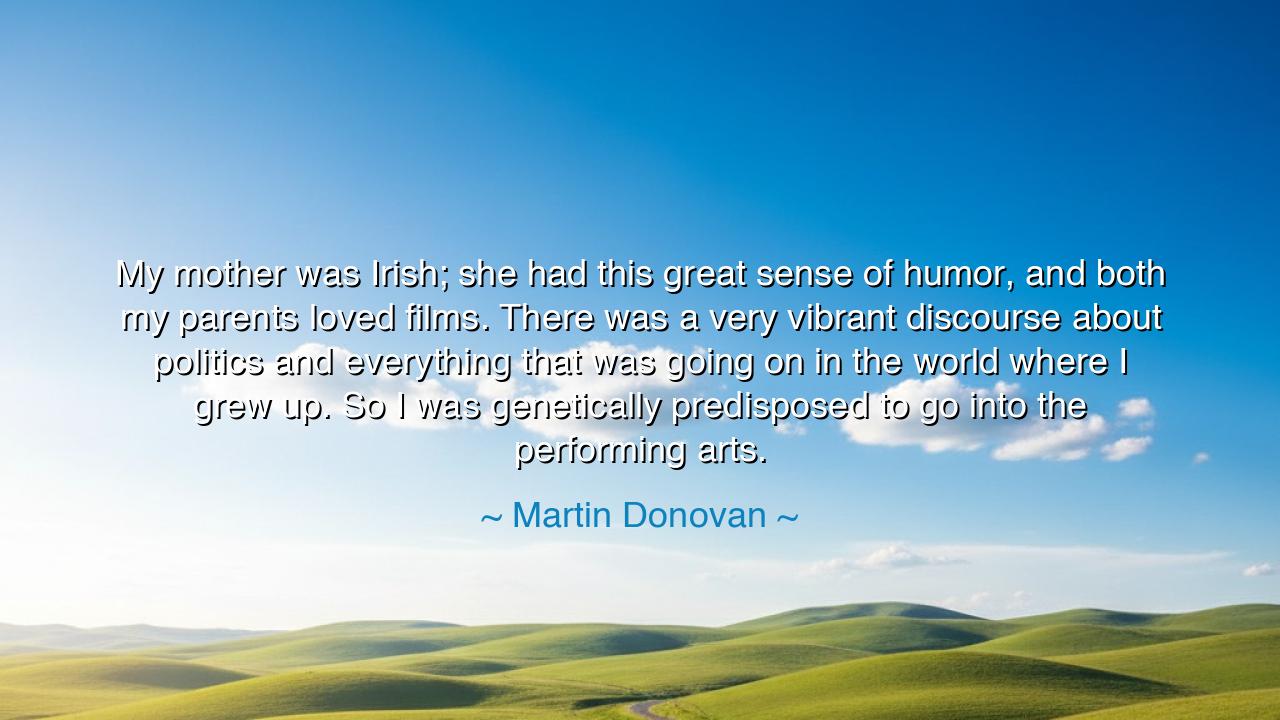
My mother was Irish; she had this great sense of humor, and both
My mother was Irish; she had this great sense of humor, and both my parents loved films. There was a very vibrant discourse about politics and everything that was going on in the world where I grew up. So I was genetically predisposed to go into the performing arts.






When Martin Donovan said, “My mother was Irish; she had this great sense of humor, and both my parents loved films. There was a very vibrant discourse about politics and everything that was going on in the world where I grew up. So I was genetically predisposed to go into the performing arts,” he was not merely reminiscing about childhood. He was revealing the alchemy of inheritance — how a soul is forged in the furnace of family, culture, and curiosity. His words are a hymn to the unseen forces that shape a person’s destiny: heritage, humor, art, and conversation. They remind us that what we become is born not just from ambition, but from the atmosphere in which we are raised — the laughter we hear, the ideas we breathe, and the passions that surround us like air.
The meaning of this quote lies in the powerful interplay between nature and nurture. When Donovan speaks of being “genetically predisposed,” he does not speak of science alone, but of spirit — the legacy of temperament, wit, and imagination that flows through bloodlines. His Irish mother, with her humor both tender and fierce, passed on more than laughter; she passed on resilience, that uniquely Irish gift of finding light in darkness. His parents’ love for film and discourse gave him the tools of observation and empathy — the very heart of the performing arts. In such a household, art was not an abstract dream, but a living conversation. Every story told, every debate shared, every laugh exchanged became part of the fabric of his becoming.
In the ancient world, philosophers believed that a person’s destiny was woven long before birth — that the threads of ancestry carried both talent and purpose. Yet they also taught that one must awaken to these inheritances, to consciously live the gifts one has received. So it was with Donovan. He grew up amid dialogue and imagination, where humor met intellect and art met politics — and in that meeting, his soul found its calling. For the performing arts are not born of vanity, but of empathy. They are the mirror through which society sees itself, the voice through which truth is spoken, and the fire through which human experience is made eternal. Donovan’s upbringing, filled with lively conversation and artistic love, was the soil in which this empathy grew.
There is an ancient tale that mirrors this truth — the story of Pericles, the great Athenian statesman. As a child, he was surrounded by philosophers, poets, and orators. His home was a gathering place for discourse and laughter, much like Donovan’s. His mother, Agariste, was known for her intellect and wit, and she taught him to think with both reason and heart. From her, Pericles learned to speak not merely to minds, but to souls. His greatness did not come from blood alone, but from the home that nurtured his curiosity and sense of justice. So too does Donovan’s story remind us that the household is the first theater, the first academy, the first stage where the soul rehearses its destiny.
Humor, in particular, is one of humanity’s oldest teachers. The ancients understood that laughter is not frivolous — it is a shield against despair, a way to see truth without breaking under its weight. Donovan’s Irish humor, inherited from his mother, carried that same wisdom: the power to endure life’s hardships by transforming them into stories, songs, and smiles. It is no accident that many of the world’s greatest actors, writers, and orators have been born of humor — for humor requires timing, empathy, and insight, the very qualities that make art come alive.
In Donovan’s memory of “vibrant discourse,” we hear the rhythm of a home alive with passion — where ideas were not feared but welcomed. To grow up in such an environment is to be trained in the art of listening and feeling, the twin pillars of any true performer. Every conversation becomes a lesson in humanity; every debate, a rehearsal in empathy. The performing arts are not merely about performance — they are about understanding the human condition, and Donovan’s upbringing gave him a head start in this sacred vocation.
And so, my listener, take this lesson to heart: you too are the product of unseen inheritances. The stories of your parents, the laughter of your ancestors, the conversations that shaped your youth — these are not accidents. They are threads of destiny, waiting for you to weave them into something new. Like Martin Donovan, you must honor your lineage by using its gifts. Cultivate humor, for it will make you wise. Engage in discourse, for it will make you awake. Immerse yourself in art, for it will make you whole.
For in the end, Donovan’s words remind us that art is not learned — it is remembered. It is the echo of our parents’ laughter, the reflection of our culture’s struggles, the continuation of the world’s oldest dialogue: the dialogue between truth and beauty. To live artistically, then, is to live consciously — to know that every word, every gesture, every creation carries within it the spirit of those who came before. Let your life, like Donovan’s, be a performance worthy of your heritage — honest, vibrant, and full of laughter that reaches beyond time.






AAdministratorAdministrator
Welcome, honored guests. Please leave a comment, we will respond soon